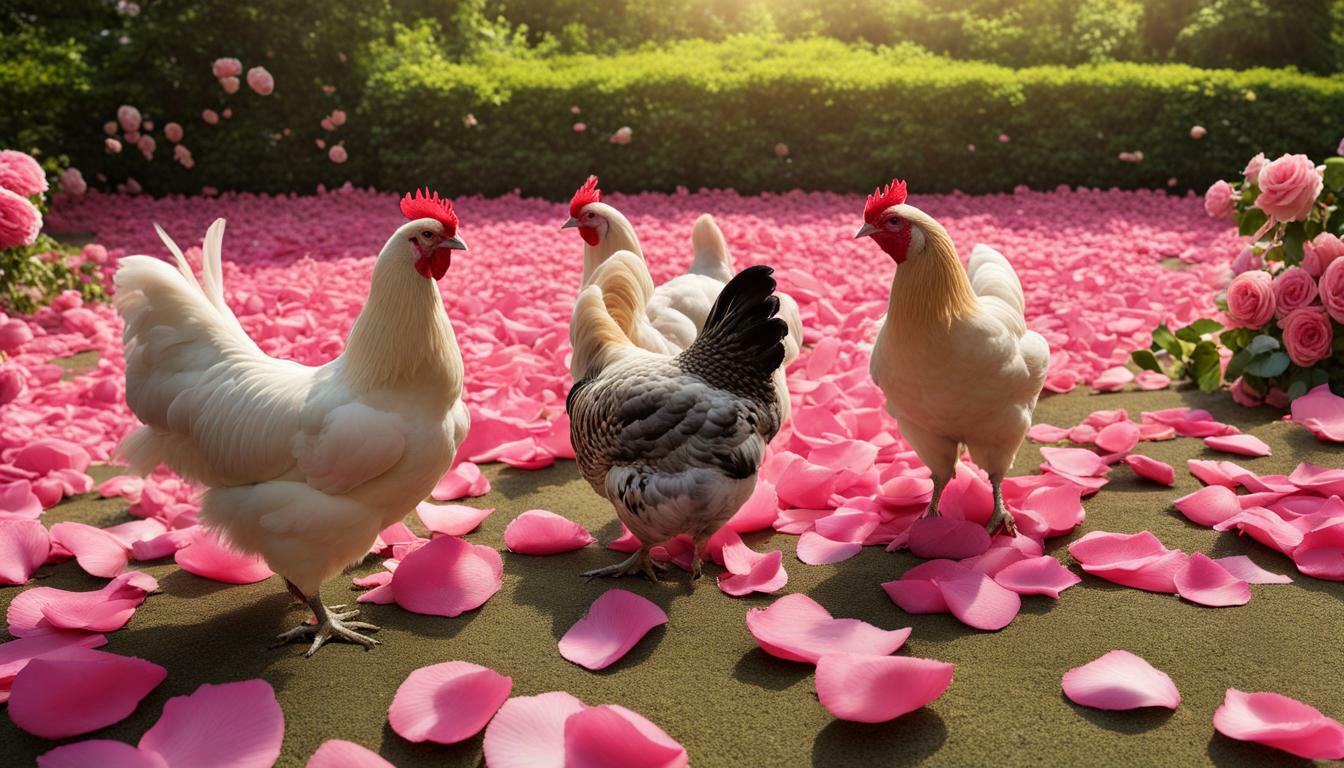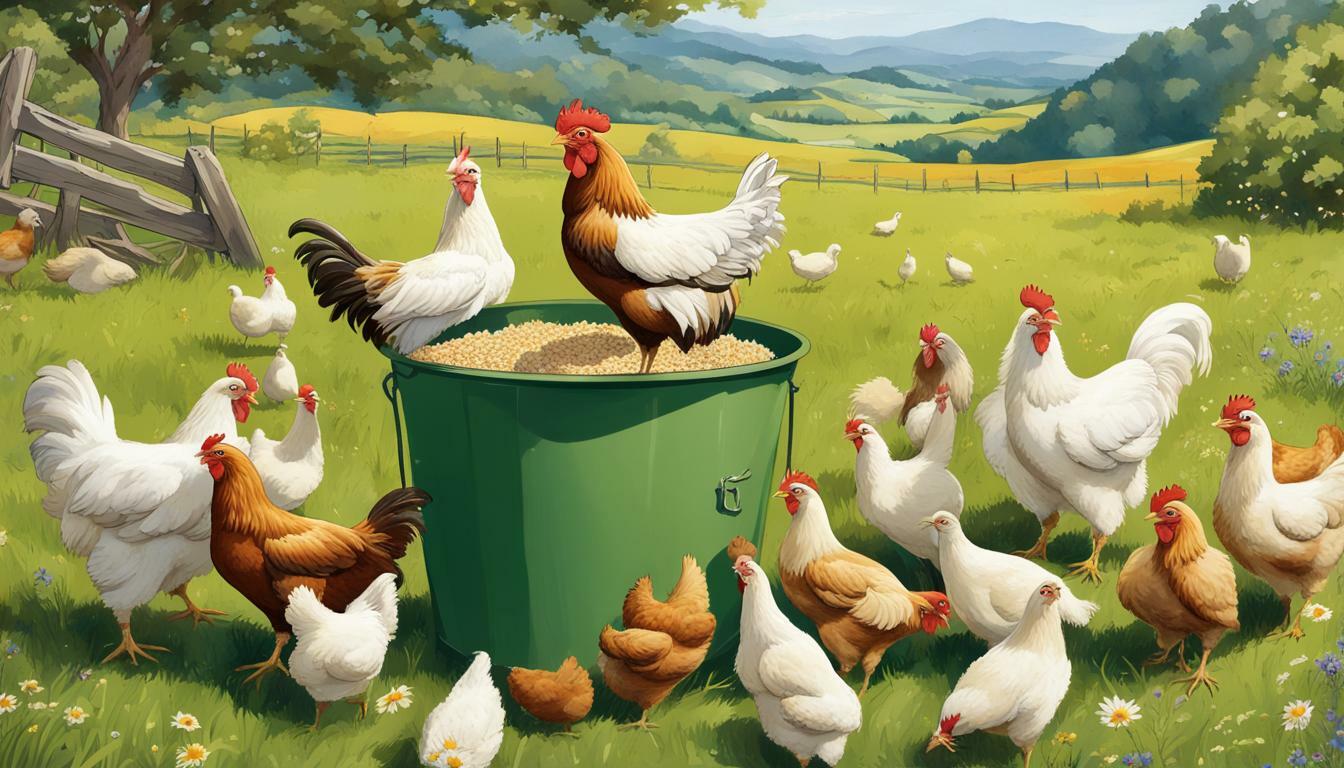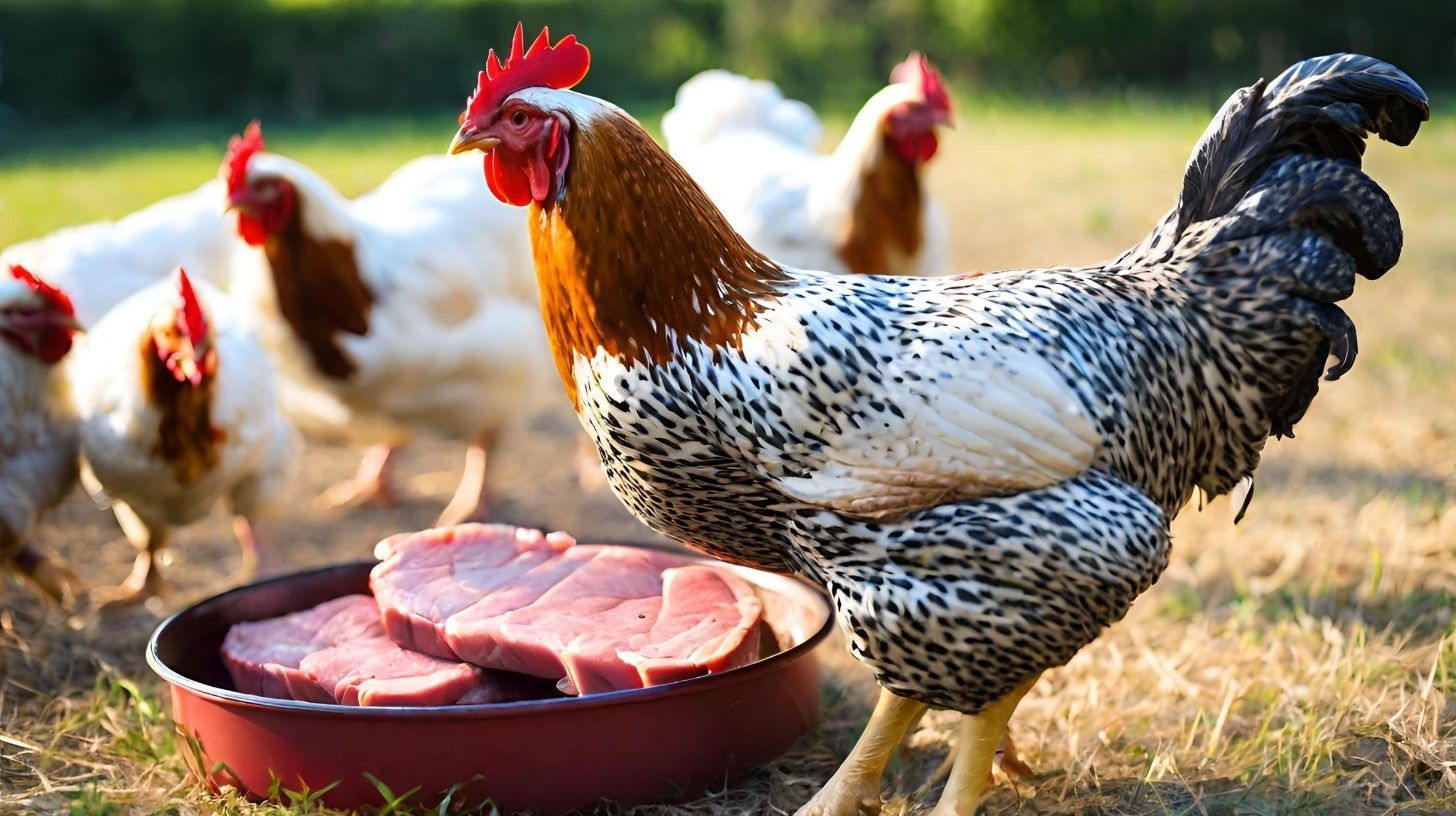Can Chickens Eat Rose Petals?

Table of content:
- Are Rose Petals Safe for Chickens?
- What Happens If Chickens Eat Rose Petals?
- Do Chickens Like Rose Petals?
- What Do Rose Petals Do To Chickens?
- Should I Feed My Chickens Rose Petals?
- Can I Give My Chickens Rose Petals From My Garden?
- Are Dried Rose Petals OK for Chickens to Eat?
- Is It Good to Add Rose Petals to Chicken Feed?
- Can Too Many Rose Petals Make Chickens Sick?
- Final Thoughts
Chickens can eat rose petals in moderation as an occasional treat or supplement to add more variety to their diet. Rose petals contain beneficial nutrients and antioxidants that can support chicken health. However, too many rose petals may cause digestive upset.
Are Rose Petals Safe for Chickens?
Fresh or dried rose petals are generally safe for chickens to eat in small amounts. Roses grown without pesticides or chemicals are the healthiest option.
Rose petals contain vitamins, minerals, and beneficial phytonutrients like polyphenols and carotenoids. These compounds provide antioxidants that can boost chicken immunity and health.
The main safety concerns with roses are thorns injuring chickens and potential exposure to chemicals. Remove thorns before feeding roses. Wash petals to reduce chemical residues if roses weren’t grown organically.
Overall, pesticide-free rose petals are a natural, nutritious supplement for chickens when fed occasionally and in moderation.
What Happens If Chickens Eat Rose Petals?
When chickens eat small amounts of rose petals, beneficial effects can include:
- More colorful egg yolks from carotenoids.
- Increased immunity and health from antioxidants.
- Improved feather and skin quality.
- Enriched foraging and pecking experience for behavioral enrichment.
However, eating too many rose petals can lead to:
- Diarrhea or digestive upset from high fiber content.
- Decreased feed intake and egg production if petals displace nutrient-rich feed.
- Illness in rare cases of toxicity from pesticide exposure.
Overall impacts depend on the amount consumed. Small, occasional portions of pesticide-free rose petals are safe for chickens and provide nutritional variety.
Do Chickens Like Rose Petals?
Chickens are naturally attracted to colorful, fragrant flowers like roses. The red pigments, sweet scent, and floral textures appeal to chickens’ senses.
Rose petals offer:
- Visual appeal from the vivid colors that attract chickens.
- Olfactory appeal from the lovely rose aroma.
- Gustatory appeal from the mildly sweet floral taste.
- Tactile appeal from the soft, layered petal textures.
These qualities make rose petals an engaging food that catches chickens’ attention and satisfies their foraging instincts. The novelty provides environmental enrichment. Chickens will enthusiastically peck at fresh or dried rose petals.
What Do Rose Petals Do To Chickens?
When eaten in moderation, rose petals provide nutritional benefits:
- The high fiber content aids digestive health.
- Carotenoids like lycopene and xanthophylls provide red pigments that enhance egg yolk colors.
- Powerful antioxidants boost immunity and overall health.
- Nutrients like vitamin C, calcium, and manganese support bone and feather strength.
Rose petals also offer behavioral enrichment:
- The pecking motion satisfies natural foraging behaviors.
- The unique texture and scent provide sensory stimulation.
- Novel foods like rose petals reduce boredom by adding variety.
However, overconsumption may cause loose droppings from excess fiber. Limit rose petals to a few times a week.
Should I Feed My Chickens Rose Petals?
Rose petals are a safe, natural supplement for chickens when fed in moderation. Here are some tips for including rose petals in your chickens’ diet:
- Source pesticide-free roses, ideally homegrown or organic. Wash petals before feeding.
- Introduce rose petals slowly to avoid sudden digestive upset.
- Limit petals to one or two handfuls shared among chickens 2-3 times per week.
- Mix rose petals into feed for easier intake than free-feeding petals.
- Remove thorns, stems, and leaves which can be choking hazards. Just feed the petals.
- Monitor chickens after initially feeding roses. Reduce quantity if any issues arise.
- Discontinue feeding if chickens show decreased appetite, diarrhea, or other adverse effects.
With proper introduction and limits on quantity, rose petals make a nutritious, natural addition to a balanced chicken diet. The fiber, carotenoids, and antioxidants offer health benefits while the foraging enriches behavior.
Can I Give My Chickens Rose Petals From My Garden?
It’s fine to feed chickens rose petals from your own garden in moderation. Homegrown roses are ideal since you can confirm they are chemical-free.
Select petals from roses grown without:
- Pesticides
- Herbicides
- Fungicides
- Insecticides
- Chemical fertilizers
Wash and air dry petals before feeding. Remove thorns, leaves, stems, and any damaged petals.
Introduce garden rose petals gradually mixed into feed to avoid digestive upset. Limit treats to a few times weekly.
Feed chickens fresh rose petals within a day or two for peak nutrition and appeal. You can also dehydrate excess petals to preserve them. Dried petals will store longer in an airtight container out of sunlight. Rehydrate before feeding.
Using rose petals straight from your garden is a perfect way to provide chickens with natural foraging variety.
Are Dried Rose Petals OK for Chickens to Eat?
Dried rose petals are safe for chicken consumption. Drying helps preserve the nutrients, pigments, and antioxidants.
To dry rose petals:
- Select fresh, ripe petals. Wash and pat thoroughly dry.
- Spread petals in a single layer on a baking sheet or drying rack.
- Place in a warm, dry spot out of direct sunlight.
- Dry for a few days until crisp.
- Store dried petals in an airtight container in a cool, dark place.
Before feeding, rehydrate dried petals in water for 15-30 minutes to restore moisture and appeal.
Then introduce rehydrated dried rose petals the same as fresh – gradually mixed into feed in small amounts 2-3 times per week.
Properly dried and stored rose petals can be fed to chickens for up to a few months for nutritional variety. Discard any that become moldy. Dried petals are ideal for preserving garden roses to feed chickens year-round.
Is It Good to Add Rose Petals to Chicken Feed?
Adding a few dried or fresh rose petals directly into feed can encourage intake. The alluring color and scent attract chickens at mealtime.
To include rose petals in feed:
- Use 1-2 tablespoons of dried petals or 1/4 cup fresh per average-sized bird. Adjust amounts based on flock size.
- Mix petals into a crumble or pellet ration using a spoon or gloved hands. Ensure petals are evenly distributed.
- Feed rose petal-enhanced feed twice weekly for a supplemental dose of nutrients.
- Monitor feed intake. Decrease rose petal quantity if chickens refuse enhanced feed.
- Store any leftover feed properly to avoid spoilage.
The fiber, antioxidants, and pigments in rose petals make them a suitable periodic addition to chicken feed. The key is keeping portions small and frequency to just a couple times weekly for a nutritional boost without overdoing it.
Can Too Many Rose Petals Make Chickens Sick?
While rose petals offer nutritional benefits, overconsumption can cause issues like:
- Diarrhea from the high fiber content if large amounts are eaten.
- Decreased appetite and egg laying if too many petals fill chickens up.
- Potential pesticide toxicity if the roses were sprayed with chemicals.
- Intestinal blockages in rare cases if chickens eat whole rose heads.
To prevent problems, always:
- Source organic, chemical-free rose petals when possible.
- Remove thorns, stems, leaves, and any damaged petals. Only feed the petals.
- Introduce rose petals slowly and in small amounts.
- Limit petal treats to a few times weekly for variety without overdoing it.
- Monitor chickens’ droppings and egg production. Reduce or eliminate petals if any concerns arise.
Enjoy rose petals as an occasional treat, but don’t overfeed. With proper introduction and quantity control, rose petals can safely enrich chickens’ diets.
Final Thoughts
Fresh or dried pesticide-free rose petals offer a safe, nutritious supplement for chickens when fed sparingly. The fiber, carotenoids, and antioxidants provide health benefits. The unique aroma, taste, and texture also stimulate natural chicken behaviors like foraging and pecking. Add a few rose petals from your garden or organic dried petals to your flock’s feed a couple times a week for enriching variety they will enjoy. Just be cautious not to overfeed to prevent digestive upset. In moderation, rose petals can be a colorful, fragrant, and nutritious addition to a balanced chicken diet.
Welcome. I’m Adreena Shanum, the proud owner of this website, and I am incredibly passionate about animals, especially poultry. I founded adreenapets.com as a labor of love, stemming from my desire to share my knowledge and experiences with poultry enthusiasts worldwide.




